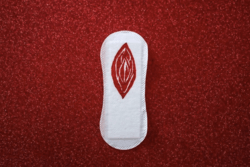The Rituals We Pass Down
My mother is modern in her love but ancient in her rituals.
When I got my first period, she slapped me across the face. Perhaps for her the slap symbolized the wild thrust out of girlhood. Perhaps it was to remind me that being a woman means being punished, with pregnancy and pain and the push-pull of caretaking and the mental load.
I hadn’t thought about this for a while, but now that I have my own children, I think a lot about ritual and meaning and the explanations I give about the ways of the world.
“Mom, do you know how you slapped me when I got my period?” I asked her on a random Saturday. “What’s the deal with that?”
“Frances,” she said, using my whole name. “It’s just what was done. It’s a thing that was passed down."
Unsatisfied with this ambiguity, I started digging into the history of the slap.
The origins of this practice are murky, debated online, and in some cases, denied as Jewish at all. According to Chabad, a movement with roots in Hasidic Judaism, this isn't a Jewish tradition. Some sources claim that it was common practice among Greeks, Turks, and Eastern Europeans, and was adopted by Jews who lived among people from these cultures. Rabbi Goldie Milgram researched the custom and found that some European Jewish mothers would give their daughters a blessing for health and fertility and a warning to guard their “gates” against premarital entry. In its cultural history of menstruation series, Gladrags, makers of reusable menstruation products, cited the theory that the slap brings a rush of blood to the face, pulling it away from the lower abdomen and relieving a potentially heavy flow. I can tell you from personal experience that this does not do the trick.
The ritual of the slap has stayed with me. Even now, whenever I get my period, I think of disappointment and of my mother. Maybe this isn't surprising—Jewishness and disappointment share a lot of overlap. (See the humor of Larry David, creator of Seinfeld and Curb Your Enthusiasm for proof.) The Talmud teaches us that no human being leaves this world having even half of one’s hopes and desires wholly fulfilled. Put another way in this gorgeous essay: "Disappointment—the nonfulfillment of expectation—is the mournful poetry of the Jewish soul."
Fertility and disappointment have been woven together for me in other ways, too. It took many years of trying to have a baby the old-fashioned way before my husband and I moved on to IVF. Every month that I hoped for a positive pregnancy test and got a period instead, I felt disappointed. Even now, after my husband got a vasectomy and baby-making is behind us, I’m still a tinge disappointed when I bleed every 31-34 days. There’s no slap, but I still feel its sting.
Now that I have a daughter, I'm faced with the choice: Do I continue the tradition of the slap when the time comes? Or if it should end with me?
Which got me thinking: why do some cultures punish and others celebrate their menstruating daughters? In some parts of Ghana, girls are showered with lavish gifts under ceremonial umbrellas and treated like queens simply for menstruating. Women in the the Amazonian Tikuna tribe in Brazil enter womanhood via a spiritual retreat filled with dance and historical teachings. But in Nepal’s chhaupadi practice, those who have their periods are secluded from the rest of their community. In my research, I stumbled on the story of an woman in Macedonia who had to wash her underwear in isolation after getting her period.
Ritual is a hot topic these days. Across social media, parenting forums, and TikTok reels, there is a collective reckoning with the traditions we were raised with, and many people sounding off about those we should say goodbye to (diet culture, motherhood as martyrdom, the taboos of fertility). But family rituals can be profound anchors that help us make sense of the turbulence of the world. So often, I refer to my parents and my mental playbook of how they would handle a situation to feel grounded and validated before making my own parenting decisions.
Even when I’m not thinking about it, I find myself reaching for the past to inform the present. Recently, my daughter lost her first tooth, and I was confronted with a much smaller but still significant question of ritual. I scrolled through elaborate, modern “Tooth Fairy” ideas—crypto and Venmo deposits, augmented-reality fairy sightings—before calling my mom to ask about my childhood ritual. I decided to leave a couple of dollars under her pillow, just as she did for me.
Right now, with the historic rise in antisemitism and anti-Jewish rhetoric, Jewish ritual feels too important not to pass down. I don’t love the physical violence of the slap, but I appreciate a connection to history, to my foremothers, to the knowledge that I’m passing on something my daughter will remember. For now I’ve decided that I won’t slap my daughter when she gets her first period. But I won’t discard the weight of inheritance either. I will pass down other things—Friday night candles, the insistence on asking big questions, the belief that tradition, even when painful, binds us together.
I have the agency to be modern in my parenting and to create new rituals, but the old ones still live within me. Maybe that’s what it means to be a mother: to stand at the intersection of what we were given and what we want to give. To decide, over and over again, what we carry forward and what we leave behind.








My Mother was probably much older than your Mother, born in 1921, her Mother born in the late 1800s. Yes the slap came and hard, out of the blue. I was expecting joyousness I was so excited, entering womanhood, as my older sister had 4 years before me. I started crying, and asked, "Why did you do that." Here is an answer you will appreciate I think: "When we were growing up my parents believed that the Devil lived in trees, and anything wood in your home... and if you said something nice about someone, and you were near anything wood, you had to "knock on wood" Why? The knocking knocked the Devil out! The Devil would want to harm anything that was good. And so the slap was given, because a young girl was vulnerable during her first menses, she was "open" as the blood was coming out. And the slap would banish him forever, and you would have good luck with your periods not being too painful, and your pregnancies and births easy with health babies. -- YES. This was the ancient reason. And my Grandmother was born in Israel, he father was a Rabbi. His father was a Rabbi. These are old sayings. Remember "Rashi's Daughters" The book is filled with amulets and superstitions too. Hope this helps.
If you raise your beautiful daughter with any of the traditions and love that you were raised with
She will be as amazing as you. You are quite the
Woman anyone is so lucky to have in their lives. I am one of the lucky ones🩷